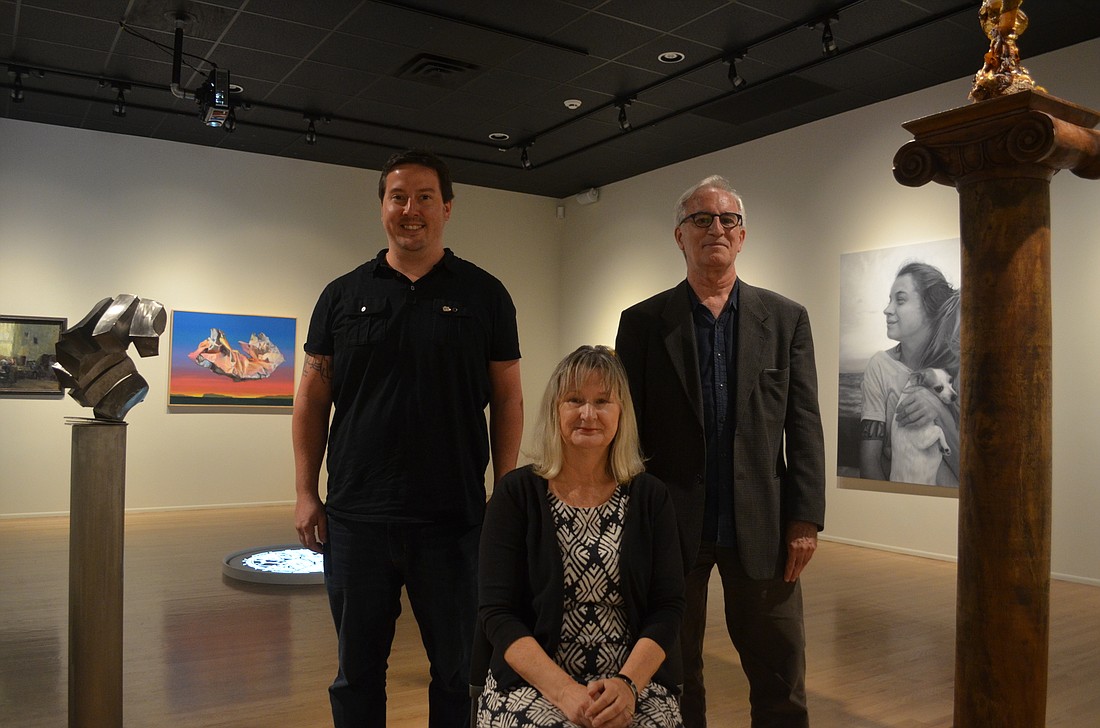- November 28, 2024
-
-
Loading

Loading

Like they do dozens of times each year, Tim Jaeger, Laura Avery and Mark Ormond are preparing the Selby Gallery for an upcoming show at the Ringling College of Art and Design. The trio, which comprises the college’s gallery administrative team, is placing pieces of Cuban art on the gallery walls. Just outside, the sounds of construction serve as a reminder of the college’s rapid growth, which has now made its way to the campus’ oldest gallery.
The mood is bittersweet — not only is this the gallery’s final show of the semester – it will be the Selby Gallery’s last show ever.
After 30 years of shows, classes, lectures and community gatherings, the Selby Gallery is being demolished. When the gallery’s final show, “Cuban Art from the Collection of Jorge Reynardus,” closes Dec. 9, the walls will be stripped of art for the last time, and construction crews will tear it down to make way for the next phase in Ringling College’s evolving identity: The Richard and Barbara Basch Visual Arts Center — a 38,000-square-foot, $10 million state-of-the-art facility, which will include a gallery, classrooms, and studios for woodworking, glass, ceramics, printmaking, photography and digital fabrication.
Although the gallery will soon be gone, the memories of its more than 400,000 visitors and artwork from more than 200 shows will live on.
The Selby Gallery first opened in 1986. It became the college’s first gallery space thanks to a grant provided by the Selby Foundation. And in 1998, before the college’s rapid growth, it received a complete overhaul, with new electric wiring, track lighting, insulation and a paint job.
This accessible gallery, located just off U.S. 41 on Dr. Martin Luther King Jr. Way, has been, for the majority of its life, a well from which students, artists and the community have drawn inspiration.
“We used to refer to ourselves as the front door of the college,” says Laura Avery, interim director of galleries at Ringling College. “It’s a place people knew they could come to for something interesting that they couldn’t see anywhere else.”
Because it was also the largest building on campus, not only did it serve to hold the latest art shows, it also hosted lectures and receptions. And for many students, the gallery was one of the first places their work was displayed, and in some cases, bought, at the annual “Best of Ringling” senior showcase.
“I think it’s one of the places students remember on campus more than any other place, even their dorm,” says Tim Jaeger, the college’s gallery assistant. “As an artist, it’s where you wanted to be. It was always a place you knew you were going to run into other artists, writers — anybody in the industry.”
Some of those memorable exhibitions include David Budd’s striking abstract pieces, Tom Feelings’ brutal depiction of the Middle Passage and the American slave trade and a reading by iconic American Beat poet Allen Ginsberg. It has been a muse that has inspired students and even brought them back.
For professional artist Omar Chacon, who graduated from Ringling in 2002, the gallery served as his introduction to the professional art world. Chacon spent a lot of quality time in the gallery as a student monitor, watching the space and answering questions for visitors during the week.
“I felt a little intimidated when I walked in because everything looked so elegant,” he says. “But working at the gallery when the shows were going up and getting to talk with visiting artists, it was wonderful. I felt like I was part of the art world for the first time.”
The Ringling College campus has grown rapidly in recent years. Over the last decade, the school has added two new multistory buildings and five additional campus art galleries. But it was the 3,000-square-foot Selby Gallery that remained the center of the campus and the surrounding community’s art world. For most of its history, it was Sarasota’s only continual venue for contemporary art.
“It was a place where you came to see the Sarasota art world,” says Mark Ormond, curator of exhibitions. “You knew you’d be amongst your peers and colleagues and creative people. A lot of ideas were born here at those openings and events.”
And although the gallery has been an iconic fixture for three decades, even the best buildings can’t escape the march of progress and growth. Ringling College President Larry Thompson says the new visual arts center and its gallery will serve as the meeting place for art, people and ideas traditionally held by the gallery. It will be the centerpiece of what the school has always been about: the fine arts.
It will be more than a year before the Basch Visual Arts Center opens after the December demolition. During construction, the gallery staff will host their planned programming in the college’s smaller gallery spaces, like the Smith Gallery and the Basch Gallery inside the Academic Center.
And though the community will soon have access to a state-of-the-art facility, it’s still difficult to walk away from 30 years without some sentimental feelings.
The staff, students and community will have one last day to reflect on all their Selby experiences at a party. Taking place on the closing night of the final show, the party will usher in a new era while celebrating the legacy of the school’s oldest gallery.
Jaeger says he’ll miss the gallery, but he’s looking forward to continuing its artistic mission.
“I think our programming, our reputation and our consistency are going to carry over,” says Jaeger. “It’s a new building. It will have a different name, but we’ll have the same people and even greater quality shows.”